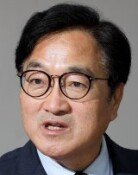[Opinion] Stakes and the General Elections
[Opinion] Stakes and the General Elections
Posted January. 23, 2008 07:38,
Success has already begun, President Roh Moo-hyun said at the ground breaking ceremony for the Naju Innovation City held in Naju, South Jeolla Province last November. But why did the president, who was absolutely convinced of success, hold groundbreaking ceremonies for five innovative cities in such a rush last year. If its such a good idea, there shouldnt be a need to drive in stakes since it would be continued by the new administration. It certainly arouses curiosity whether the Roh administration, which has only one month left in office, is still convinced of the success of innovation cities.
The Board of Audit and Inspection pointed out that the inflow of population to the 10 innovation cities nationwide is small. Meanwhile, experts have not hidden their concerns that these cities can be ghost towns.
Hastening groundbreaking ceremonies was not a panacea. Fortunately, a groundbreaking ceremony has not been conducted in the remaining five cities. If the Implementation Plan Approval and Consultative Compensation Rate of 50 Percent were followed, criteria that the Ministry of Construction and Transportation insisted, a groundbreaking ceremony would soon be held in three more places. However, preparations have yet to be made.
Roh, himself, said, I want to hammer in the stakes and spikes during my term. This proves that last years groundbreaking ceremonies were stakes knocked into place before the incoming administration can change the plans.
In a win-win strategy revealed to heads of local governments, President-elect Lee Myung-bak laid out plans for the national capital region and non-capital region. Unlike President Rohs strategy to develop regional areas while checking the development of the national capital region, Lees strategy pursues tailored development to suit regional characteristics. However, there is something strange. Although the incoming administration adopted restructurings, such as privatization of public corporations, mergers of government agencies, as a key policy and turned down the Roh administrations balanced-development policy, it has remained silent on the revision of the administrative city or innovation city plans. For instance, two-thirds of the Rural Development Administration (RDA) is planned to be transferred to Jeonju Innovative City, but the RDA is now expected to become a research institution.
The presidential transition team said it will carefully review those issues when the new administration takes office, citing the sensitivity of the matters. It is strategically avoiding the announcement of policies that may lose votes in regions ahead of the April general elections. If changes for innovation city plans are inevitable, the best way to address the matter would be to suspend construction for the time being. However, the transition team says that it will not deliberate on the issues due to the upcoming general elections. Unfortunately, this can only make innocent local residents suffer.
Editorial writer Hong Kwon-hee,konihong@donga.com







